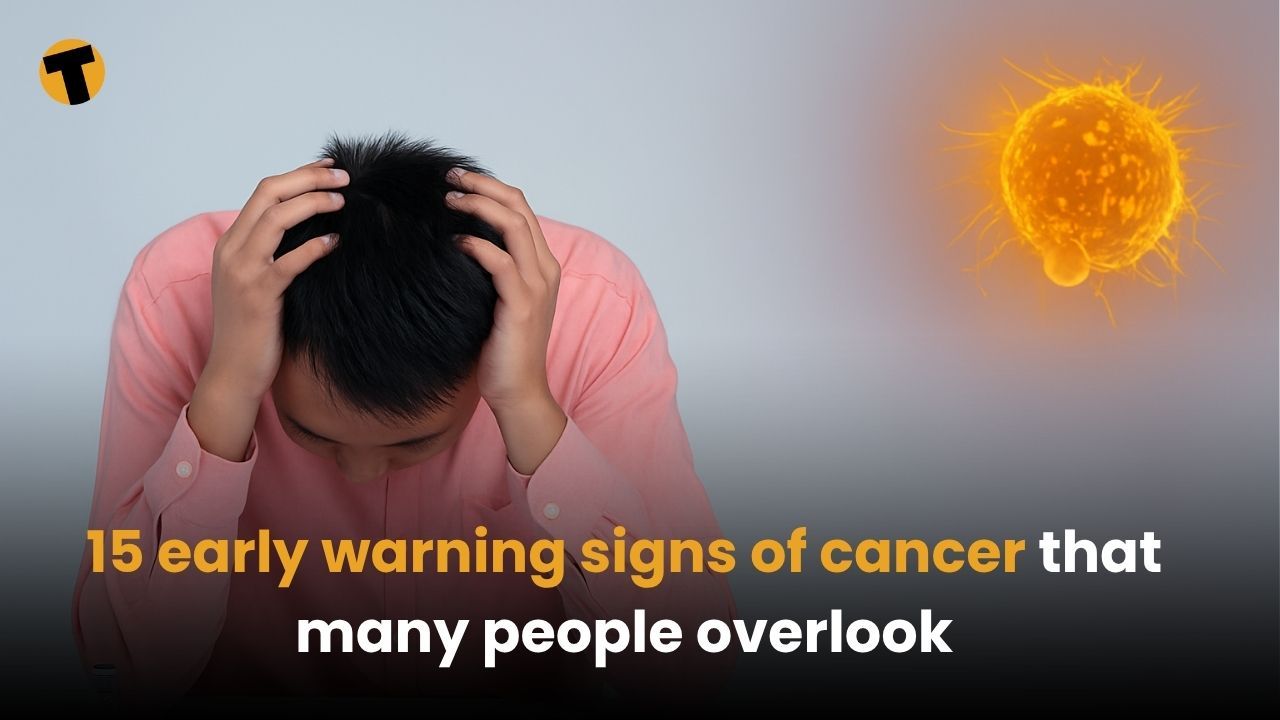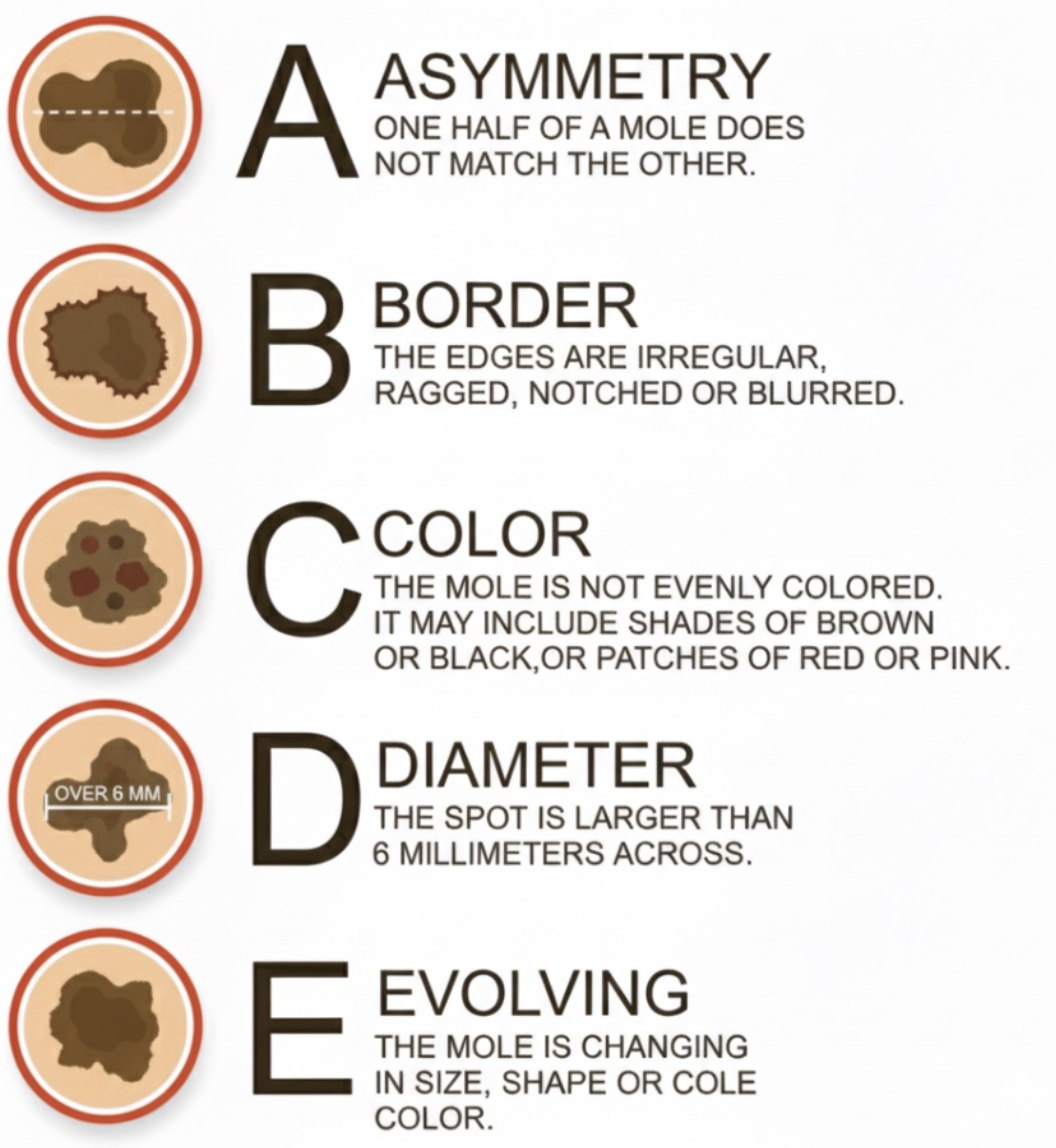15 early warning signs of cancer that many people overlook
What your body may be trying to tell you long before diagnosis

According to the National Cancer Institute, around 140,000 new cancer cases are reported in Thailand every year, averaging about 400 cases per day. However, many people only discover the disease once it has already advanced. The World Health Organization repeatedly stresses that detecting cancer in its early stages significantly increases survival rates.
You should pay attention to the warning signs from your body that should not be ignored and these signals indicate when it may be time to see a doctor as soon as possible.
Why you must pay attention to small signals from your body
When cancer is still small, the body often sends subtle warnings that seem insignificant — such as feeling slightly more tired than usual, losing a little weight without trying, or having a persistent cough that feels like a cold you can’t shake off. Many people choose to tolerate these symptoms, thinking they will see a doctor later when the pain becomes worse or daily life is affected.
But data from the World Health Organization (WHO) clearly states that diagnosing cancer in its early stage leads to more effective treatment, higher chances of survival, fewer complications, and significantly lower medical expenses.
Thailand’s Department of Medical Services and the National Cancer Institute also report similar findings: the country has around 140,000 new cancer patients each year (about 400 per day) and over 80,000 deaths annually. Cancer remains one of the leading causes of death in Thailand.
Experts emphasise that most symptoms are not cancerous, but when abnormalities persist longer than usual, are unexplained, or get progressively worse, you should let a doctor investigate instead of self-diagnosing through the Internet.
Cancer organisations in many countries use a simple guideline for deciding when to seek further testing:
If symptoms last longer than 2 to 3 weeks, do not improve, or return shortly after improving with medication, you should see a doctor for further evaluation.
Warning signs people often assume will just go away

Sudden weight loss without trying
- Losing 5 to 10 kg within a few months
- Not dieting or exercising more than usual
- No clear explanation (e.g., heartbreak, stress, reduced appetite)
This type of weight loss can be linked to various conditions — from thyroid problems and chronic infections to cancers of the digestive system, lungs, or liver.
Fatigue or chronic exhaustion
- Waking up feeling tired, wanting to continue sleeping
- Simple household chores are becoming exhausting
- No improvement despite adequate rest
Chronic fatigue can be caused by anaemia, heart disease, depression, or cancers that alter the body’s energy use. If accompanied by weight loss, paleness, dizziness, or fast breathing, a doctor should perform blood tests.
Persistent low-grade fever and night sweats
- Low fever that comes and goes for weeks
- Night sweats are severe enough to require changing clothes or bedding
- No signs of flu or allergies
These symptoms appear in chronic infections, autoimmune diseases, and blood cancers such as lymphoma or leukaemia.
Unexplained lumps or swelling
Breast lumps or changes
Warning signs include:
- A hard lump with irregular borders attached to skin or muscle
- Skin dimpling or thickening resembling orange peel
- Inverted nipple or discharge (clear or bloody)
- Enlarged lymph nodes in the armpit
Many early breast cancers are detected through accidental self-examination. Regular self-checks and age-appropriate screening help catch the disease early.
Enlarged lymph nodes in the neck, armpits, or groin
- Increasing in size, hard, painless
- Lasting longer than 3 to 4 weeks
- Accompanied by fever, weight loss, or night sweats
Lymph nodes may enlarge due to infections, but if they do not shrink or continue growing, a doctor should check for lymphoma or metastasis from other cancers.
Testicular lumps
- Hard, painless lump or heavy sensation
- Growing in size quickly
Testicular cancer is less common but occurs more often in young men. Monthly self-examination is recommended, especially for those with undescended testicles or a family history.
Abnormal bleeding — Don’t assume it will disappear
Coughing or vomiting blood
- Fresh blood in the cough or recurrent blood-stained phlegm
- Vomiting fresh blood or coffee ground material
These symptoms can indicate tuberculosis, gastric ulcers, oesophageal tears, or cancers of the lungs and digestive tract. Seek medical care immediately.
Bloody stools or tar-like black stools
- Fresh blood coating the stool
- Black, sticky, foul-smelling stools
- Frequent bowel movements, straining, incomplete evacuation, and weight loss
Many assume it’s only haemorrhoids but chronic bleeding, especially in people over 40 or those with a family history, requires a colonoscopy to screen for early colon cancer.
Blood in urine
- Pink, red, or tea-coloured urine
- No recent trauma or extreme exercise
Possible causes include urinary stones, infections, or cancers of the bladder, kidneys, or prostate. Seeing a doctor at the first sign helps identify the cause quickly.
Abnormal vaginal bleeding
- Bleeding between periods or after sex
- Extremely heavy or prolonged periods
- Bleeding after menopause
These are significant warning signs for endometrial, cervical, or certain ovarian cancers. A gynaecological examination is necessary.
Easy bruising, frequent nosebleeds, or bleeding gums
When accompanied by pallor, fatigue, or fever, this may signal platelet disorders or leukaemia.
Changes in bowel habits or digestive symptoms
New, persistent changes
- Alternating diarrhoea and constipation for weeks
- Frequent urges but small output
- Noticeably thinner stool shape
These may be caused by IBS but require medical evaluation in middle age, especially with weight loss or rectal bleeding.
Bloating, abdominal fullness, feeling full quickly
Especially in women:
- Persistent bloating
- Early satiety
- Pelvic or lower abdominal pain
- Weight loss or fatigue
These may be associated with ovarian cancer or abdominal cancers involving excess fluid.
Difficulty swallowing and chronic heartburn
- Food feels stuck when swallowing
- Increasing difficulty swallowing solids
- Severe heartburn with weight loss or vomiting blood
Possible causes include acid reflux, oesophagitis, or cancers of the oesophagus/stomach.
Respiratory changes and voice changes
Chronic cough lasting more than 3 weeks
- Dry or phlegm-producing cough
- No improvement after treating for a cold or bronchitis
- High risk in smokers
Guidelines in many countries advise seeing a doctor after 3 weeks to rule out lung cancer.
Shortness of breath or chest tightness
- Breathless after minimal exertion
- Sudden new chest tightness
- Alongside chronic cough, weight loss, or chest pain
Doctors will evaluate for heart disease, lung disease, or lung cancer.
Hoarse voice or change in tone
If hoarseness lasts longer than 3 to 4 weeks without a cold or heavy voice use, doctors should examine the larynx and thyroid.
Skin changes, moles, and non-healing sores
Moles changing shape, colour, or size
Dermatologists use the ABCDE rule:
- A – Asymmetry
- B – Border irregularity
- C – Colour variation
- D – Diameter over 6 mm
- E – Evolving (growth or change)

These are early signs of melanoma.
Mouth sores or lesions that won’t heal
- Mouth ulcers lasting more than 2–3 weeks
- White or red patches on the tongue/cheeks
- Cracked lips in smokers or heavy drinkers
These may indicate oral cancer.
Yellow skin and eyes
Jaundice results from high bilirubin levels and indicates problems with the liver, bile ducts, or cancers of the liver/pancreas.
Sex-specific symptoms
Women
Besides abnormal bleeding and breast changes:
- Chronic pelvic or lower abdominal pain
- Persistent bloating
- Frequent urination or incontinence
These may relate to the uterus, ovaries, or pelvic floor.
Men
- Frequent urination, especially at night
- Weak or interrupted urine flow
- Blood in urine
- Testicular lumps or changes
These may involve prostate enlargement, infection, or prostate/bladder cancer.
Neurological symptoms
Headaches are unlike anything before
- Increasingly severe headaches
- Daily headaches
- Waking up from pain or morning headaches
- With vomiting, blurred vision, double vision, or unsteadiness
Other neurological signs
- Weakness or numbness on one side
- Seizures with no history
- Declining memory or personality changes
- These do not always indicate brain cancer but may signal abnormalities such as bleeding, tumours, or infections.
When to make an appointment and when to go to the hospital immediately

Make an appointment within 1–2 weeks if you have:
- New symptoms lasting more than 2 to 3 weeks
- Unintentional weight loss of 3 to 5 kg in a few months
- Persistent fatigue despite rest
- Cough lasting more than 3 weeks or ongoing hoarseness
- Clear changes in bowel or urinary habits
- New lumps growing rapidly or changes in breasts/testicles
Go to the hospital immediately if you have:
- Coughing or vomiting blood
- Bright red rectal bleeding or tar-like black stool with dizziness
- Dark red urine
- Sudden difficulty breathing or chest tightness
- Weakness on one side, seizures, slurred speech, or double vision
- Severe, sudden headache, unlike anything before
These danger signs are used in clinics worldwide to help ensure that patients with potential cancer or serious illness receive timely evaluation.
The goal is not to “guess whether you have cancer,” but to understand your body well enough to seek medical care promptly. The important thing is not to self-assess using a checklist, but to observe your body’s changes. If abnormalities persist or worsen, see a doctor for proper evaluation. Most results will not be cancer, but for those who do have it, early diagnosis gives the best chance of effective treatment.
Thailand’s National Cancer Institute emphasises that prevention and early detection are the cornerstone of fighting cancer, regardless of age.
Disclaimer: This article is intended to provide general information and cannot replace medical history-taking, physical examination, or professional diagnosis. If you or someone close to you has concerning symptoms, consult a doctor.
The Thaiger key summary
- Early detection significantly increases survival rates, yet many symptoms are ignored for weeks or months.
- Unexplained changes, including weight loss, persistent coughs, abnormal bleeding, lumps, or digestive issues, require medical evaluation if they last over 2 to 3 weeks.
- Most symptoms are not cancer, but seeking prompt medical advice helps catch serious conditions early and improves treatment outcomes
Latest Thailand News
Follow The Thaiger on Google News:


























